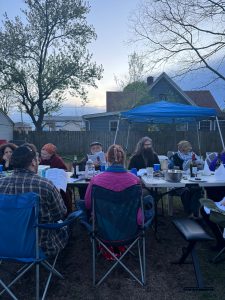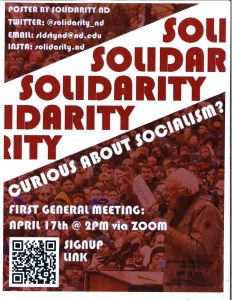O Holy Night is my favorite Christmas song. Being that it is one of the most often played ones, I never gave the lyrics much thought until several years ago. I had recently begun reading theory and getting into progressive ideas (especially ones informed by religion). I was at mass on Christmas and heard O Holy Night and started bawling my eyes out. Since then, every time I hear it during the Christmas season it brings me a feeling of hope.
I believe my faith life should not be constrained solely to the individual and the contemplative. We are called to act radically to bring the world further into right relationship with God. And yet, in working towards this I am constantly disappointed. We can often feel helpless in a place with the highest prison population, military budget and healthcare costs that has been demonizing anti-capitalist solutions for decades. The genocide in Palestine is continuing to expand, while many university students (including our own) still have not been brought to justice for simply asking the university to align themselves on the side of the oppressed. It is very easy for me to be discouraged and think the intrinsic nature of the world is to be drenched in social sin and darkness.
But the lyrics of O Holy Night speak to my doubts. An infinite God was able to be contained by time and space. God chose to make His presence known to us materially in Jesus. Jesus’ existence was not the exception in an evil world, but an invitation to see God’s grace physically in His beautiful creation. As the song says, “Long lay the world in sin and error pining/He appeared and the soul felt its worth”. Our world has worth. It is not simply a vessel to perpetuate systemic injustice. We need to have hope that “yonder breaks a new and glorious morn”. We need to have hope that the “the arc of the moral universe is long, but it bends toward justice,” as Martin Luther King Jr. said. But until then, we are not to be passive. The song continues, saying that in “In all our trials, [Jesus was] born to be our friend”. Jesus is not a distant, mysterious deity pulling strings behind the scenes. Jesus is alongside us, a partner in fighting for a better world. Jesus is relational, Jesus is radical. “Chains shall He break, for the slave is our brother/And in His name, all oppression shall cease”. May we follow his example in our own work.



